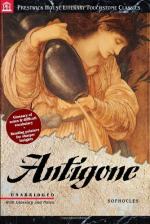|
This section contains 926 words (approx. 4 pages at 300 words per page) |

|
Antigone: A True Definition of a Tragedy
Summary: The play "Antigone" by Greek playwright Sophocles meets the true definition of what Aristotle considers the six hallmarks of a tragic work of literature. Different parts of the play and their relation to Aristotle's definition are described.
Tragedy is an imitation of an action that is serious, complete, and of a certain magnitude; in language embellished with each kind of artistic ornament, the several kinds being found in separate parts of the play; in the form of action, not of narrative; through pity and fear effecting the proper purgation for these emotions. Aristotle's' definition of tragedy is still a part of western society today. His definition not only reflected on the ideas of playwrights in his time but also after that. Shakespeare is one such person whose plays reflect Aristotle's idea of tragedy. True tragedies are rare. One such tragedy is that of Antigone written by Greek playwright, Sophocles.
According to Aristotle a tragedy is divided into six basic parts. One of which is plot. In the tragedy Antigone, there are three separate subdivisions concerning Aristotle's' definition of plot-making. Plot is the arrangement of carefully...
|
This section contains 926 words (approx. 4 pages at 300 words per page) |

|


